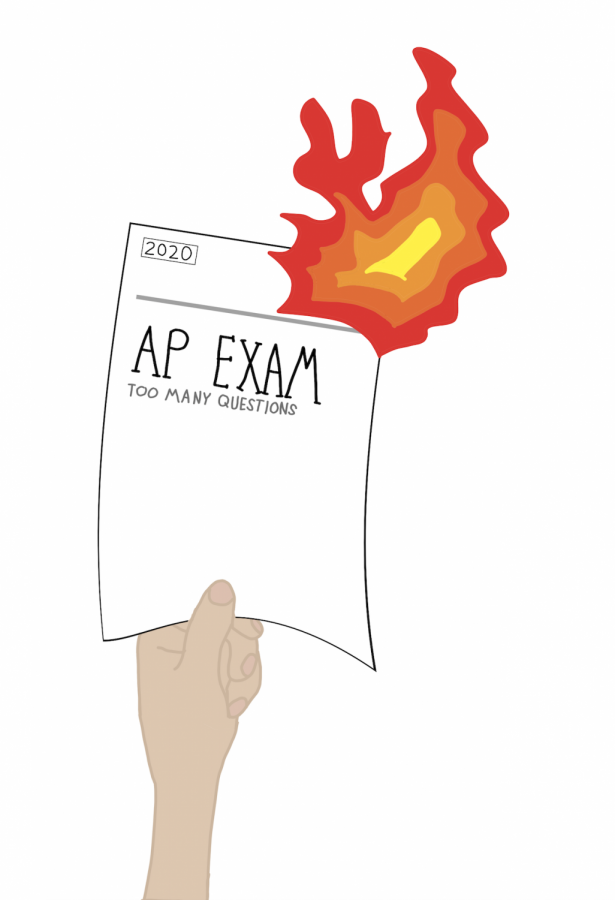Student Assistance Programs distract from the real issues
College board makes exams overpriced, “burning” students’ and parents’ money.
December 5, 2019
With recent news surrounding the ACT’s new initiative to allow students to retake only parts of the original exam to achieve higher scores and the College Board’s plan to pilot the revamped version of the adversity score known as Landscape, both corporations have earned praise or scorn from students, parents and teachers.
However, when evaluating these programs one thing becomes clear — the implementation of these projects are meant to distract from the College Board’s monopoly.
In the past decade, it would be impossible to deny that standardized testing has become a fundamental pillar in the education system. More specifically, the SAT and ACT have become pivotal players in the game of college admissions and acceptance. Nationwide, students feel a suffocating pressure to do well on these exams or forfeit a chance at getting into the top universities in the country. Both the College Board and ACT Inc. have maneuvered themselves into positions of utmost importance, clutching the education industry in a brutal monopoly at the expense of students and educators.
The College Board and ACT Inc. have acknowledged the increasing importance placed on the standardized tests they own. They have made steps to decrease unfairness in their testing system to make the exams more easily accessible for students and to develop retake systems that are easier on students. Most notably, ACT Inc. has created a new scoring system that allows students to retake individual sections of the test. ACT Inc. will also superscore a student’s exam, compiling the highest scores students achieved on each section from the test from every test they took.
Socio-economic status has become a major factor in determining the future of a child’s education. The more money parents have, the higher their capacity to provide their children with tutors for critical testing such as the ACT or SAT. Even the College Board has acknowledged that tutoring contributes to better test scores. College admissions cheating scandals have further highlighted the advantages of wealth in college admissions. These same advantages are not available for students of lower-income families who do not have the resources to provide their children with these tools.
The College Board continues to make efforts to help curb inequity that plagues standardized testing. In May 2019, the College Board announced plans to administer an Adversity Score. The Adversity Score was an untested program that ranked students on a scale of 1-100. One score would account for a student’s school environment and the other for the environment of a student’s neighborhood. These scores would indicate the obstacles particular students had to endure. This score was the College Board’s attempt to battle the inequality that surrounds its testing and how economic advantages can result in higher test scores for wealthier students.
However, following swift backlash, the College Board moved to revoke its initial plans. Instead, the College Board has now piloted the Landscape program. Although similar to the Adversity Score, Landscape’s key difference is instead of the College Board scoring students, the College Board will now provide colleges and universities the tools and information to score students themselves. This is the College Board’s attempt to balance itself as a body that measures achievement, while not crossing the boundary of being a moral compass for economic inequality.
Despite these attempts to make testing easier and more fair for students, both corporations chose to ignore the most important part of the construction of their institutions: at the end of the day, they are both corporations.
While both ACT Inc. and the College Board are nonprofits, they reap vast amounts of money from the fees of their standardized tests. In 2018 alone, the College Board reported that over two million students took the SAT with $47.50 each test (not including the essay). The College Board has made a decent penny off the education system. This also does not include the money that the College Board is able to make off AP exams as well. In addition, the College Board has been reported to have collected a revenue of $1.07 billion in 2017 alone. This number can be expected to increase, considering the escalating rates of college competitiveness.
In reality, the programs that ACT Inc. and the College Board are implementing are meant to distract from the real issues that plague the education system. Both companies have managed to worm their way into the foundations of the education system and build their institutions on their corporate principles. Students nationwide are seen struggling over the testing systems the College Board and ACT Inc. have created. By implementing these reformation programs, both institutions seek to remedy the problems that have been created from their monopoly.







